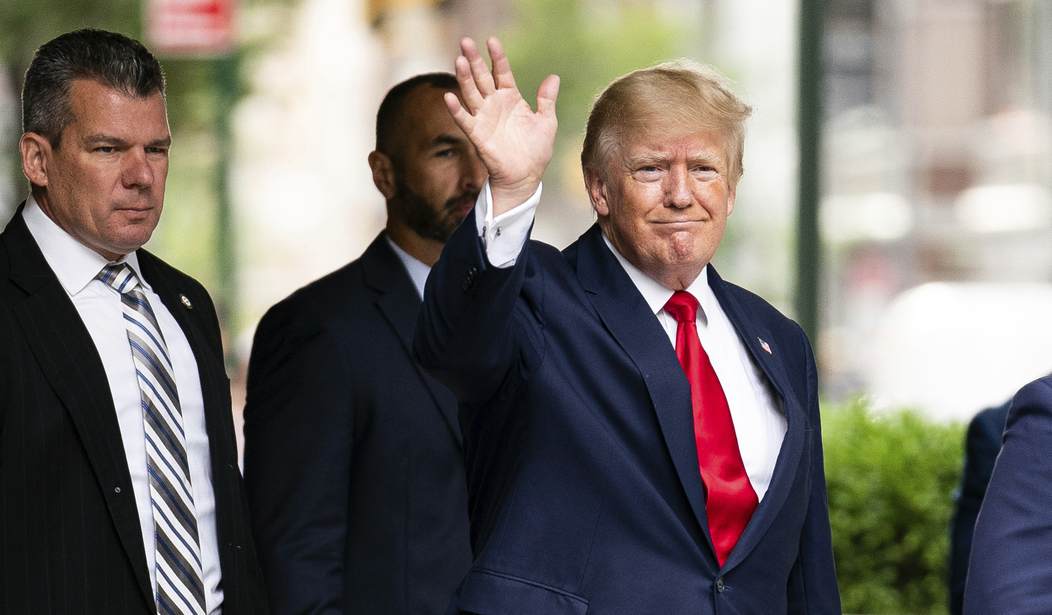Once given up for dead, Democrats are increasingly optimistic about their chances in November's midterm elections. The race for the House is narrowing, although Republicans are still predicted to win control, while the race for the Senate is a toss-up. Formerly pessimistic Democrats now think November will not be an unmitigated disaster for their party.
A major factor in that change is former President Donald Trump. Trump was always going to be a factor in the race, but now it appears he might become a preeminent factor in the race. This makes Democrats very happy. They have long hoped to make the midterms about Trump, hoping to capitalize on his unpopularity with large swaths of the electorate, and now that appears to be happening.
That is bad news for Republicans. The New York Times recently reported that some GOP leaders used to be confident there would be a red wave in November, but now they are "signaling concern that the referendum they anticipated on President Biden ... is being complicated by all-encompassing attention on the legal exposure of a different president: his predecessor, Donald J. Trump."
Well, how did that happen? How did there come to be "all-encompassing attention" on the former president? Because the Biden Justice Department took the unprecedented step of getting a search warrant and raiding Trump's winter home in Florida as part of a possible prosecution over alleged mishandling of presidential documents. The Justice Department's criminal investigation of Trump raised the Trump Factor in the midterms to a newer, higher level.
And that was on top of House Democrats' made-for-TV investigation of Trump in the form of the Jan.6 committee. The committee's hearings, produced with a showrunner who used to head ABC News, are currently on summer hiatus but will return in September, just in time for fall campaigning.
Recommended
In other words, the prime movers of the "all-encompassing attention" paid to Trump are the Biden Justice Department and Nancy Pelosi's House Democrats. Of course biased media play a role -- who is megaphoning the message? -- but the drivers of this phenomenon are the Democrats who control Washington at the moment.
This is from Politico's Playbook:
"The burst of reporting reconsidering the conventional wisdom that Democrats will be crushed in the 2022 midterms continues this week. Most of the pieces emphasize that the return of Trump -- through the January 6 Committee, the fringe candidates he's backing and the multiple investigations he faces -- could help Democrats bury their differences with anti-Trump Republicans and independents and unite into a majority coalition similar to the one that fueled Democratic victories in the Trump-centered elections of 2018 and 2020." A "Trump-centered election" -- that is music to a Democratic strategist's ears.
One complicating factor for Republicans is that Trump wants to be the center of attention in the midterms. He wants to be the center of attention all the time. He set out to play a decisive role in a number of Republican primary contests, and in many of them he achieved his goal. Trump also appears to believe he can use the Justice Department investigation to garner support among Republicans who might have been cooling on him but now believe him to be unfairly targeted -- just as he was unfairly targeted in the yearslong Russia investigation. Trump has, by all accounts, sought ways to benefit politically from the FBI raid on Mar-a-Lago, and he will try to benefit politically from future developments, as well.
But Trump is in reactive mode. He is reacting to what the Biden Justice Department is doing. He is reacting to what House Democrats are doing. It is the Democrats in power, in the executive branch and on Capitol Hill, who are proactively bringing Trump to the fore as the election nears.
A few caveats. One, there are, of course, other issues at play. Democrats hope that reaction to the Supreme Court's abortion decision will energize base voters and push some independent voters away from Republican candidates. For decades, conservatives hoped to return the issue of abortion to the states, where it properly belongs, according to the Constitution. Now that that has happened, it has quite predictably, and properly, politicized the issue in the states. If Democrats can use the abortion decision politically against Republicans in state and local elections -- well, that is the political debate conservatives wanted. Republicans can't blame Democrats for that one.
Finally, don't overstate the Republicans' problems or the Democrats' progress. Biden is still unpopular, with a job approval rating of 42% in the RealClearPolitics average of polls and 42.4% in FiveThirtyEight. Historically, that is the predicate for bad midterms for Democrats. Also, Republicans continue to have a small lead in the generic ballot question. The number of Americans who are dissatisfied with the direction of the country is enormous. And inflation and the economy remain the voters' top issues. All of that is bad news for Democrats and is unlikely to change in the next 10 weeks.
But don't discount the gains Democrats have made, using their power in the Justice Department and in the House of Representatives, putting Trump in a higher place in voters' minds than he might otherwise have been. Is that ethical? Proper? Legal? For most of the press, that's an argument for later. The fact is, Democrats have done it, and they have the power to keep doing it until Nov. 8.
This content originally appeared on the Washington Examiner at washingtonexaminer.com/opinion/trump-is-bigger-factor-than-ever-in-midterms-how-did-that-happen.
(Byron York is chief political correspondent for The Washington Examiner. For a deeper dive into many of the topics Byron covers, listen to his podcast, The Byron York Show, available on the Ricochet Audio Network at ricochet.com/series/byron-york-show and everywhere else podcasts are found.)

























Join the conversation as a VIP Member